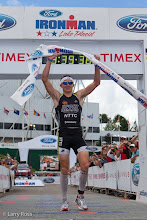Every once in a while, an experience jolts you from your quotidian existence, prompting a period of reflection and analysis. In the midst of planning my season of racing, I was drawn to the most recent posts on Slowtwitch regarding the plight of pro triathletes. Seth Wealing sparked an interesting debate on what pros can do to better their standing, and to better the sport of triathlon. Unfortunately, the discussion devolved some to focus mostly on how pros can get more money, and how the sport can be more like American football or baseball. By far the most comprehensive and insightful reply came from Slowtwitch founder, Dan Empfield, as he made some suggestions for helping all pros improve their lot, mostly by developing their brand off the course.
The issue that arose for me in this discussion was the constant reference to the "problems" in the sport of triathlon. It seemed that the discussion moved further from the ideas which might fuel true improvement in the sport, and instead focused on bagging the sport. I have always been a believer in putting emphasis on solutions rather than problems, and although problems must exist and be addressed to prompt resolution, meditating on them doesn't accomplish much. True survivors develop solutions.
The root issue for a lot of us as "pro triathletes" is to find a way to live and support ourselves financially while continuing to train and race in the sport we love. For some of the top elites, it's a reality, but for a good number it's an ongoing struggle. Seth's post initiated a huge number of replies, ranging from the extremely critical to the indifferent, but not many really acknowledged what a blessed existence we lead. While reading the new book, "Born to Run," what really struck me was the discussion of how just being an athlete can help shape happier, better people. It's not just about developing the physical, but also the mental, and when I think about what I get to do day in and day out, it's not hard to be grateful and content.
It's important to remember that nobody is making us race triathlon. Although the sport is still very young and developing, some of the realities surrounding sponsorship are well-established. I only bring this up because it seemed that the majority of the posts were emphasizing how triathlon can be more marketable, bigger, with more money and spectators. As I said before, it's a struggle for a good number of us to make a living, to travel to races, pay rent, and eat absurd volumes of food, but there are much bigger struggles in the world, initiated by forces outside of people's control. My outlook has always been the same when it comes to triathlon: I love competing, being part of a community of dedicated athletes who do interesting things, enjoy themselves, push the boundaries of what is physically and emotionally possible. I have told myself time and time again that I will know it is my time to stop when the sport no longer fuels my spirit, or inspires me to be a better person. In a word, when I no longer enjoy what I am doing.
Let's take a step back, remember our roots, and forget about the money for a minute. Don't you love riding your bike? Running some trails? Getting an early swim in while the rest of the world sleeps? We don't NEED more money, fame, spectators, or airtime. We need a deeper passion for our sport.

